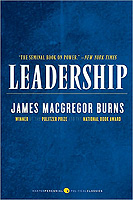 |
| ||||||||||||||||
 |
LeadershipJames MacGregor Burns
Excerpt from Leadership Chapter One THE POWER OF LEADERSHIP We search eagerly for leadership yet seek to cage and tame it. We recoil from power yet we are bewitched or titillated by it. We devour books on power--power in the office, power in the bedroom, power in the corridors. Connoisseurs of power purport to teach about it--what it is, how to get it, how to use it, how to "gain total control" over "everything around you." We think up new terms for power: clout, wallop, muscle. We measure the power of the aides of Great Men by the number of yards between their offices and that of Number One. If authority made the powerful "giddy, proud, and vain," as Samuel Butler wrote, today it entrances both the seekers of power and the powerless. Why this preoccupation, this near-obsession, with power? In part because we in this century cannot escape the horror of it. Stalin controlled an apparatus that, year after year and in prison after prison, quietly put to death millions of persons, some of them old comrades and leading Bolsheviks, with hardly a ripple of protest from others. Between teatime and dinner Adolf Hitler could decide whether to release a holocaust of terror and death in an easterly or westerly direction, with stupendous impact on the fate of a continent and a world. On smaller planes of horror, American soldiers have slaughtered women and children cowering in ditches; village tyrants hold serfs and slaves in thrall; revolutionary leaders disperse whole populations into the countryside, where they dig or die; the daughter of Nehru jails her political adversaries--and is jailed in turn. Then too, striking displays of power stick in our memories; the more subtle interplays between leaders and followers elude us. I have long been haunted by the tale of an encounter with Mtesa, king of Uganda, that John Speke brought back from his early travels to the source of the Nile. The Englishman was first briefed on court decorum: while the king's subjects groveled before the throne, their faces plastered with dirt, Speke would be allowed to sit on a bundle of grass. Following an interlude of Wasoga minstrels playing on tambira, the visitor was summoned to the court, where women, cows, goats, porcupines, and rats were arrayed for presentation. The king showed an avid interest in the guns Speke had brought. He invited his guest to take potshots at the cows, and great applause broke out when Speke dropped five in a row. Speke reported further: "The king now loaded one of the carbines I had given him with his own hands, and giving it full-cock to a page, told him to go out and shoot a man in the outer court, which was no sooner accomplished than the little urchin returned to announce his success with a look of glee such as one would see in the face of a boy who had robbed a bird's nest, caught a trout, or done any other boyish trick. The king said to him, `And did you do it well?' `Oh, yes, capitally.' " The affair created little interest in the court, Speke said, and no one inquired about the man who had been killed. It is a story to make one pause. Mtesa was an absolute monarch, but could a man be randomly shot at the whim of the tyrant--indeed, of a boy? Did the victim have no mother or father, no protective brother, no lover, no comrade with whom he had played and hunted? The case of the nurse of the children of Frederick William, king of Prussia, may be more instructive. Despising the mildly bohemian ways of his oldest son, the king heaped humiliation on him and flogged him in public. When the crown prince fled with a companion, the king had them arrested, falsely told his wife that their son had been executed, beat his children when they intervened in their brother's behalf, and dealt with the companion--the son and grandson of high-ranking generals--by setting aside a life imprisonment sentence imposed by a military court in favor of the death penalty. He forced his son to watch while his friend was beheaded. One of the few persons to stand up to the king was the nurse, who barred his way when he tried to drag his cowering children out from under the table, and she got away with it. Sheer evil and brute power always seem more fascinating than complex human relationships. Sinners usually outsell saints, at least in Western cultures, and the ruthless exercise of power somehow seems more realistic, moral influence more naive. Above all, sheer massed power seems to have the most impact on history. Such, at least, is this century's bias. Perhaps I exemplify the problem of this distorted perception in my own intellectual development. Growing up in the aftermath of one world war, taking part in a second, studying the records of these and later wars, I have been struck by the sheer physical impact of men's armaments. Living in the age of political titans, I too have assumed that their actual power equaled their reputed power. As a political scientist I have belonged to a "power school" that analyzed the interrelationships of persons on the basis only of power. Perhaps this was fitting for an era of two world wars and scores of lesser ones, the murder of entire cities, bloody revolutions, the unleashing of the inhuman force of the atom. I fear, however, that we are paying a steep intellectual and political price for our preoccupation with power. Viewing politics as power has blinded us to the role of power in politics and hence to the pivotal role of leadership. Our failure is partly empirical and psychological. Consider again the story of Mtesa and Speke. It is easy to suspend disbelief and swallow the story whole, enticing as it is. But did the English visitor actually know what happened in the outer court? Was the king staging an act for him? If a man did die, was he an already doomed culprit? If not, would Mtesa later pay a terrible price at the hands of his subjects? Or turn back to the brutality of Frederick William? Was his "absolute" power more important than the moral courage of the nurse who resisted him? So shocking are the acts of tyrants, so rarely reported the acts of defiance, that we forget that even the most despotic are continually frustrated by foot-dragging, quiet sabotage, communications failures, stupidity, even aside from moral resistance and sheer physical circumstance. |
|||||||||||||||||||||
|
All prices subject to change and given in U.S. Dollars. |
All materials contained in http://www.LeadershipNow.com are protected by copyright and trademark laws and may not be used for any purpose whatsoever other than private, non-commercial viewing purposes. Derivative works and other unauthorized copying or use of stills, video footage, text or graphics is expressly prohibited. LeadershipNow is a trademark of M2 Communications, LLC. |
